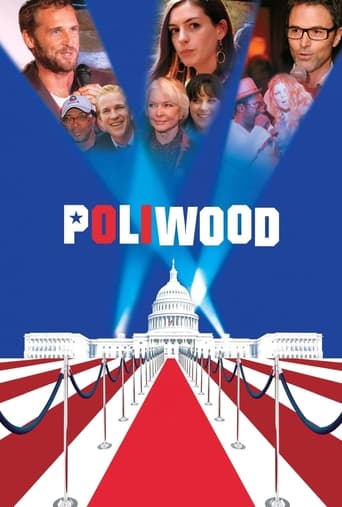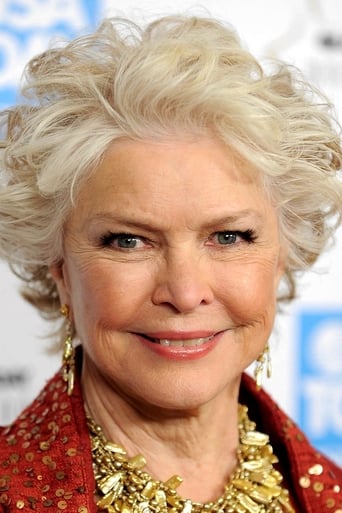GamerTab
That was an excellent one.
Greenes
Please don't spend money on this.
Stephan Hammond
It is an exhilarating, distressing, funny and profound film, with one of the more memorable film scores in years,
Skyler
Great movie. Not sure what people expected but I found it highly entertaining.
Robert J. Maxwell
Barry Levinson's documentary is not really about politics but about the relationship between politics, celebrity, and the media, which Levinson calls "an unholy alliance." If Levinson has a political opinion in the standard sense of the term, it's not readily apparent.The director evokes a Frank Capra movie from the early 40s as an example: "Meet John Doe." The movie stars Gary Cooper as an ordinary guy who is picked to represent a fictional character by a newspaper. He's picked to be made into a public hero because he looks photogenic and he acts in an innocent and ordinary way. And John Doe DOES become a populist hero. The newspaper takes him on tour. He reads rousing speeches about the nation being made up of "little guys like us," written for him by Barbara Stanwyck, a reporter. John Doe Clubs spring up all around the nation. He's adored, lauded wherever he goes.Then, back to reality, there is Joe the Plumber, if anyone remembers him. He was an ordinary guy who asked Barack Obama a simple, challenging question during the campaign. The media loved Joe the Plumber, a husky, plain-looking Midwesterner with a shaved head. He looked right. He could speak in complete sentences. He was taken on tour and lauded. But he was swept up by the losing side and today, a man of no journalistic experience and no background in politics, the media has lost interest and Joe has faded from public consciousness after writing a book and becoming a motivational speaker.This isn't to denigrate Joe the Plumber or his political philosophy but to emphasize the nature of celebrity. There was unquestionably a similar element of "celebrity" in Barack Obama and his campaign. Expensive inflatable sneakers decorated with Obama's face are now advertised on television. You can buy an authentic Barack Obama chia doll. (Obama's head is filled with dirt and, when it's watered, tiny leaves sprout from it.) I've taken up a lot of space with John Doe and Joe the Plumber, one fictional and one real, because it summarizes the main points I think Levinson is trying to make. The television camera, he tells us in a few black-and-white editorial inserts, is "entertaining" but "a disaster" for the news because it confuses make-believe with the truth. "Reality TV" is not "reality," he reminds us.Some of the Hollywood celebrities we see have pointed political views. We're probably familiar with most of them. But, on the whole, they're not the ego-ridden airheads we might have expected. And some have frankly come to learn something about the issues and how the system works, and they find themselves embarrassed when reporters ask them to make comments on complex issues. I mean, what the hell does Anne Hathaway know about the role of structured derivative instruments in an economic collapse? More engaging points that Levinson makes. What can a celebrity or politician "sell" on TV? Not funding for the arts or education. The channel gets switched. But they can sell conflict and outrage which, like natural disasters, receive ready attention.Sometimes, if you want to make your pitch for a cause, "celebrity" provides a more powerful platform than "politics." For many years, global climate has been one of Al Gore's chief concerns. Yet, as Vice President, he could not engage the media. But once out of office, a private citizen and public figure, he could organize a persuasive presentation, film it, and win an Academy Award -- not because he was a former Vice President but because he had become a celebrity.Anyone who wants to, can find weaknesses and bias in "Poliwood." Who knows what wound up on the cutting room floor? But they'd have to work at it because Levinson, who treats all his guests politely and with sweet reason, seems GENUINELY gripped by the ethical problem of politics/celebrity/media, and not by any particular social issues. He doesn't ask anyone about political issues and his subjects' comments are mostly limited to the subject at hand, the confluence of politics, celebrity, and the media. Sixty years ago it was mandated that the networks devote at least some part of their air time to news, as a public service. The news departments of all networks consistently lost money, but they were willingly done by professionals as pro bono publico. Now it's not about public service but ratings.
BrianMemphis
The horrible picture quality of the footage from newscasts and movies was a big turn off. Even the clip of 'Wag the Dog' which was Levinson's own movie was presented in sub-hi-def quality image in 4:3 format. It looks like all of the other footage was highly compressed and pulled from YouTube then zoomed in to full size. The original footage of course looked fine. Not a whole lot of new or shocking themes in the movie. This would be a good primer for someone who didn't know about the Nixon/Kennedy debates or that news was driven by ratings, but not sure who that person would be. The parts of the movie that worked the best were the actors telling their personal stories.
Gluck-3
"Make Believe" is what our world has come to, according to the intelligent voice of Barry Levinson.One criticism of an external review was that POLIWOOD is meandering; indeed, there is no neat beginning, middle and end. But that's all right, as we are partaking in what Levinson has cleverly termed a "film essay," and strict organization is not essential, as long as the bits and pieces offer substantive value, adding up to a thought-provoking whole. Another complained that there is nothing, really, that we haven't heard before. Yet what is more important is whether the points being made are substantial, and whether they deserve to be made again, to a complacent and largely unaware public.In other words, we basically are all aware that we are living in a relatively phony world, where extremist fringe groups dominate politics, with the money/zeal to effectively manipulate the public. The movie helps us to infer that perhaps we are living at a time when these forces have become more powerful than ever before. Of course, life is going to go on, we are all too weak or busy to do anything about the way we're led on a leash, but it is of extreme importance to be reminded of this truth.Levinson tells us of a 1959 TV Guide article written by John F. Kennedy that spoke of the truths we know so well today, regarding, basically, the powerful hold of the televised media. We are reminded, for example, that the photogenic Kennedy won his TV debate with Nixon, while Nixon won with the non-visual radio medium. The GOP recognized the attractive telegenic qualities of Ronald Reagan, when Reagan gave a speech during Goldwater's 1964 presidential bid, and soon after, it was probably no coincidence that Reagan was elected as governor of California, paving the way to a political journey destined to reach the top. The message: the competence and talent of the candidate began to take second place to the person's superficial qualities. We are told that physically and sometimes personality-challenged past leaders, such as Presidents John Adams, Taft and FDR, very likely could not have survived in today's political climate, where (my example) an Arnold Schwarzenegger can get elected for all the wrong reasons.One of the more thought-provoking facts pointed out was that television stations were once required by the FCC to provide public service programming, in exchange for the privilege of controlling valuable public airwaves and the opportunity to turn great profit. This was back in the days when the news meant something, a "public service," and a credible fourth wall that kept the corruption of government in check. With the help of deregulation, where giant conglomerates have gobbled up diverse news sources (resulting in mainstream media colluding with the controlling corporate world), we know we live in far different times now, very detrimental to our democratic process, where the bottom line has taken on critical importance, and the necessity to profit has taken precedence over the fact-supplying duty of journalism. Thus, the line between news and entertainment has blurred, irrelevant celebrities appear regularly on news shows, and in order to generate greater profit, news shows focus on conflict (e.g., liberal vs. conservative spokespeople in debates), thus adding to the impossibly polarized and often uncivilized status we are seeing today.The role of celebrities in news-making is also explored, something I found of interest, because we all share, to some extent, a general contempt for, say, a not-necessarily-very-intellectual actor, who pretends to carry political influence largely on the basis of fame. In fact, we see the anger of the average citizen, when paired off with celebrities in the film's finale. POLIWOOD does not openly endorse the role of the celebrity, but recognizes the inevitable role that celebrity now carries in the political process. I enjoyed seeing celebrities in a behind-the-scenes sort of way, acting like everyday people, sometimes making sense, sometimes not.What I liked about the film was that even though the participants largely represented the Hollywood left (which is my assumption, given the presence of obvious candidates such as Susan Sarandon; yet there were other famous faces, such as Robert Davi, whose political orientation isn't familiar. They belong to a group called the Creative Coalition, which stresses that they are a "non-partisan" organization), the point of the film is not to take sides, but to reinforce what has become the disturbing and unreal "reality show" aspect of our political times. This is a concept that everyone should be concerned about, regardless of political leanings. In fact, what the film is warning against is how the media has become so much more effective in manipulating minds -- that is, the kind of mentality expressed by a fellow POLIWOOD commentator, "Styopa," in his lash-out essay entitled "Self-justification hits the big screen" (offering the first comment here; I am the fourth), where Styopa gives the impression of being so conditioned by the media of the right, he immediately sees POLIWOOD as liberal propaganda. It's rather ironic, because the entire point of the film is the sad and harmful state that we have evolved into as a society, and not an endorsement for any political view.In fact, a profound moment of the film was one exposing liberal hypocrisy. The late actor, Ron Silver, identified as the founder of the Creative Coalition, opined that too many liberals have become alarmingly intolerant, with some closing the book on further discussion, announcing that their minds have been made up, and that nothing can dissuade them. Therein lies the damaging societal gridlock, and only by examining what irresponsible forces have shaped us to such extremes can we hope to return to constructiveness and normalcy. This may be an unrealistic hope, as the controlling forces have become too powerful, but if we are not aware of these forces, choosing instead to mindlessly surrender to whatever we are being spoon-fed, then the situation will become truly impossible.
Styopa
Well, the Hollywood circle-jerk is now complete. We started with simple political movies, presenting an inherent dogma and begged questions as part of a Leftish worldview. Then we had Michael Moore, whose biased 'documentaries' (actually, cleverly contrived mosaics of out-of-context quotes, syllogisms, and cuts misrepresenting reality) would have inspired Leni Riefenstahl to tears. Then, An Inconvenient Truth, the sad story of a self-inflating concept by a desperately out-of-touch self-inflated politician who urgently needs to become relevant again - a purely political propaganda film whose synchronization with the sophomoric Hollywood worldview could be tallied by the free-flowing ejaculation as Mr Gore was handed an Academy Award for what was little more than the gussied-up rehash of the long-since-irrelevant ecological message of the 1970's: Humans BAD! Now, Mr Levinson has reached over to complete the chain, yanking Hollywood furiously to priaptic relevance as he actually made a film about how Hollywood 'activists' can participate and advance the political discussion without looking like fools. Short answer: this film proves that, at least for this bunch, they can't. Nothing is more persuasive than objectivity, which is why this group is utterly UNpersuasive. My impression is that Hollywood is so full of yes-men that these folks haven't been contradicted in years, at least not by anyone that they respect (of course, as professional narcissists, that's a pretty tall order). Barry's assembled a panel of interviewees (oh, and a token conservative, can't forget the little head-fake toward 'inclusiveness') natters on about relevance and meaning without seriously recognizing that they're all just preaching to each other. Like a sad evangelist standing on a soapbox and preaching to his wife and 18 children while everyone else walks past, Hollywood 'activists' are so convinced of their certainty, so certain of their relevance, that they don't notice that nobody is listening. Sure, the politicians are listening folks, but that's because you offer two things that politicians (the only thing as narcissistic as yourselves, by the way) need to live: money, and media time. Here's a hint: the next time a politician expresses their appreciation for your support, do a reality check. Tell them that you can't give them any money, and you refuse to PUBLICLY endorse them, but they have your full moral support. Oh, they'll shake your hand and tell you how much they appreciate it deeply, but see if they'll take the time to chat with you 'next time they're in town'. To paraphrase Homer Simpson..."Barry, just because I understand, doesn't mean I care." If he could tear himself from the cocoon of self-justification and bear to have his ideas contradicted by normal people, perhaps next time Mr Levinson could make a movie about the absurd concept of people who professionally pretend to play other people, misreading the attention that comes with celebrity as the regard that comes with respect.But then again, that's pretty unlikely.





